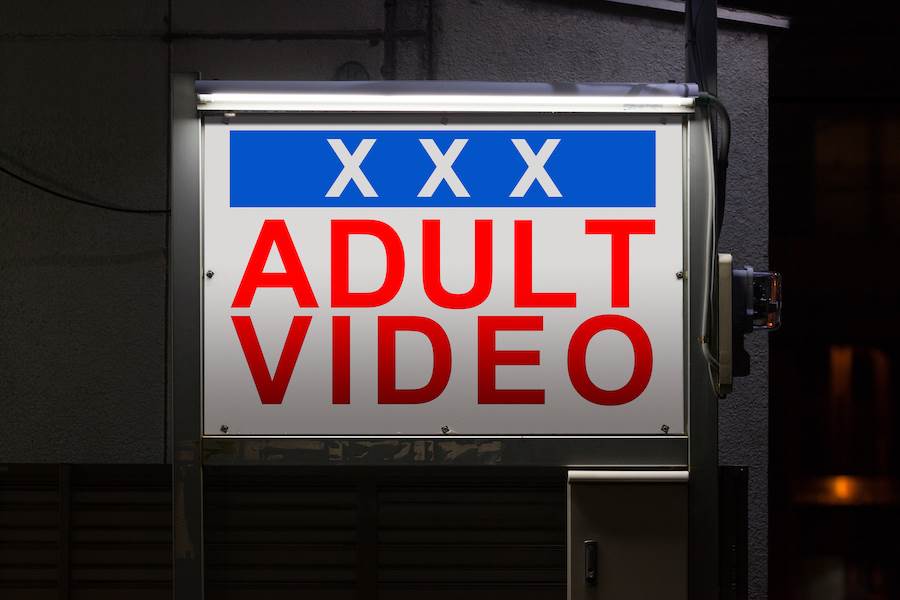NRS § 201.265 is the Nevada obscenity law that makes it a misdemeanor to sell, give, or show pornographic materials to a child under 18. This law also prohibits misrepresenting oneself as an adult in order to obtain pornography. The penalties include up to 6 months in jail and/or up to $1,000 in fines.
In this article, our Las Vegas criminal defense attorneys discuss:
- 1. What material is “harmful to minors” in Nevada?
- 2. What does NRS 201.265 prohibit?
- 3. What is the punishment?
- 4. What are the best legal defenses?
- 5. When can the criminal record get sealed?
1. What material is harmful to minors in Nevada?
Nevada’s legal definition of material that is harmful to minors (children under 18 years of age) are items which:
- contain, describe or represent nudity, sexual conduct, sexual activity, sexual excitement or sadomasochistic abuse; and
- appeal to the prurient interest, shameful interests, or morbid interests of minors; and
- qualify as patently offensive to prevailing standards in the adult community with respect to what is suitable material for minors; and
- lack serious literary, artistic, political or scientific value.
The most common examples of material that are harmful to minors include pornographic films or images. But such material can take many forms, including:
- a book, pamphlet, magazine, newspaper, printed advertising or other printed or written material;
- a motion picture, photograph, picture, drawing, statue, sculpture or other visual representation or image; or
- a transcription, recording or live or recorded telephone message.1

It is a misdemeanor sex crime under NRS 201.265 to provide children under 18 with pornography.
2. What does NRS 201.265 prohibit?
Under Nevada law, a person commits “exhibiting or selling obscene materials to minors” by knowingly doing any of the following:
- Distributing pornography unless that person is a parent, guardian or spouse of the minor;
- Exhibiting for distribution to an adult in such a way that allows a minor to access pornography unless that person is the parent, guardian or spouse of the minor;
- Selling to a minor an admission ticket or pass for any presentation of pornography unless the minor is accompanied by his or her parent, guardian or spouse;
- Misrepresenting that he/she is the parent, guardian or spouse of a minor for the purpose of either a) distributing pornography to the minor, or b) obtaining permission of the minor to present pornography;
- Misrepresenting that he/she is 18 or over for the purpose of obtaining either a) pornography, or b) admission to any presentation of pornography; or
- Selling or renting movies that contain pornography on the premises of a business establishment open to minors unless the person creates an area within the establishment that prevents minors from observing the movies or any material that advertises the sale or advertising of the movies and is labeled “Adults Only” in a prominent and conspicuous location.2
Note that it does not matter whether the harmful materials are delivered to the minor in person or through electronic communications.
Also note that NRS 201.265 does not apply to employees of state-run universities, community colleges, schools, museums or libraries who are acting in the course of their employment.3
3. What is the punishment?
Selling or exhibiting obscene materials to minors is sentenced as a misdemeanor in Nevada. The maximum penalty carries:
- 6 months in Clark County Detention Center (or other county jail), and/or
- $1,000 in fines4
Subsequent offenses carry the same sentencing range as first offenses – there are no enhancements. However, courts are more likely to order sentences on the higher end of the penalty range for repeat offenders than for first-time offenders.
Note that giving obscene materials to a minor does not carry sex offender registration in Nevada.
4. What are the best legal defenses?
The vagueness of NRS 201.265 can actually work to a defendant’s favor because it may make it more difficult for the prosecution to prove each element of a crime beyond a reasonable doubt. The following are three typical defenses a defense attorney may use to fight allegations of selling or exhibiting obscene materials to minors in Nevada.
- The materials were not harmful: What qualifies as ‘harmful to minors’ is highly subjective. If a defense attorney can show that the material in question does not rise to the level of obscene and serves a greater artistic or scientific purpose, then criminal charges should not stand.
- There was no criminal intent: It’s no crime if a defendant accidentally shows a child obscene material or if the child happens upon obscene materials that the defendant had hidden away. As long as the prosecution cannot prove that the defendant meant to sell or show the materials to the child, then the defendant does not have criminal liability.
- Law enforcement officers performed an illegal search: Las Vegas police officers often find evidence by searching a suspect’s home, motor vehicle, office, or various other non-public places. If police may have performed an illegal search, then the defense attorney can petition the judge to throw out the illegally-obtained evidence. Then if the judge agrees, the district attorney may decide to drop the whole case for lack of proof.
Note that it is not a defense that the defendant made no physical contact with the minor or had no prior convictions for lewd conduct.
5. When can the criminal record get sealed?
Once a defendant gets a misdemeanor conviction in Nevada for giving obscene materials to a minor, he/she has to wait for one (1) more year before the court may seal the criminal record. Once the record is sealed, the conviction will not show up in most background checks.
Note that dismissed charges can be sealed right away.5 Read more about sealing Nevada criminal records.

Call our DUI and criminal law firm for legal advice. We offer consultations in the state of Nevada.
Arrested for an alleged violation of state law or federal law? Contact our Las Vegas, NV criminal defense lawyers for a case evaluation. You can reach us through our online contact form or our telephone number. We appear in state and federal courts throughout Nevada.
See our related articles on solicitation of prostitution (NRS 201.354), pandering, child pornography, contributing to the delinquency of a minor, sexual assault (NRS 200.366), domestic violence (NRS 200.485), and indecent exposure (NRS 201.220).
In California? Go to our information page California Penal Code 288.2 | Harmful matter sent with the intent to seduce a minor.
Legal References
- Nevada Revised Statute 201.257; NRS 201.2581; NRS 201.259; NRS 201.2595; NRS 201.261; NRS 201.262: NRS 201.263; NRS 201.264. Note that pornography can include any type of sexual act, including masturbation, sexual intercourse, sexual penetration, and lewdness with a minor. These crimes are listed under NRS chapter Crimes Against Public Decency and Good Morals. See also Jacobellis v. Ohio, (1964) 378 U.S. 184 at loc.gov. See also 18 U.S.C. chapter 71.
- NRS 201.265 – “Unlawful Acts” (pursuant to subsections 1 – 6); NRS 201.2565.
- NRS 201.2655 – “Exemptions”.
- NRS 201.265.
- NRS 179.245; NRS 179.255; see also Finley v. City of Henderson (In re Finley), (Nevada Supreme Court, 2019) 457 P.3d 263, 135 Nev. Adv. Rep. 63; Washoe Cty. DA’s Office v. Second Judicial Dist. Court, (2020) 473 P.3d 1039, 136 Nev. Adv. Rep. 67.

